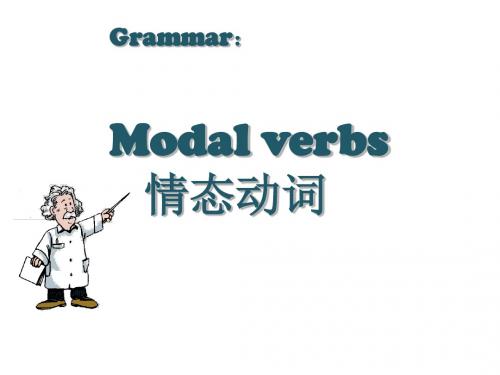一张图简述常用情态动词
情态动词(20张PPT)初中英语专项复习课件

(1)只作情态动词:must;can/could;may/might;ought to
(2)既可作情态动词又可作实义动词:need,dare
((34))既 具可 有作 情情 态态 动动词词某又些可特作征稿稿定助:定hPa动PPvTP,e词T/海h:量asd素ha材tlo持l;/s续hha更odublde;twteirll/would
【知识拓展】
1. must的一般疑问句,肯定回答为Yes, ...must.;否定回答为No, ...needn’t./No, ...don’t have
to.—Must I clean the classroom now? 我必须现在打扫教室吗?
—Yes, you must. 是的,你必须。/No, you don’t have to. /No, you needn’t. 不,你不必。
He promised he would never smoke again. 他承诺他再也不吸烟了。
Their English teacher would tell them stories in
表示过去反复发生的动 English after class.
作或某种倾向
他们的英语老师总是在课后用英语给他们讲故事
新,上千款模板选择总有一
款适合你
知识点二:情态动词的特点
情态动词的特点: (1)情态动词无人称和数的变化(have to除外); (2)情态动词后接动词原形; (3)情态动词的否定式是在其后加not; have to除外 (4)具有助动词的作用,可用来构成否定句、疑问句及用于简明答语; (5)个别情态动词有现在式和稿过定去PP式T两种形式,过去式用来表达更加客气、委 婉的语气,时态性不强,可稿用定于PPT过,海去量、素材现持在续更或将来。
英语语法小课堂:几张图片搞定情态动词的概念、特征及用法

英语语法小课堂:几张图片搞定情态动词的概念、特征及用法今天的语法小课堂,跟April老师来学习情态动词咯!概念情态动词是表示能力、义务、必须、猜测等说话人的语气或情态的动词。
常见的情态动词有:can(could), shall(should), will(would), may(might), must, need, dare, have to, ought to等。
形式变化情态动词的特征一、情态动词表示说话人的语气或情态,本身有词义,但词义不完全,不能单独作谓语,必须和实义动词一起构成复合谓语。
She must be your mother. 她一定是你的妈妈。
(“must be+名词”表示对现在状况的肯定推测)Everyone should obey the rules. 每个人都应该遵守规定。
(“should”表示一种客观肯定)二、情态动词没有人称和数的变化,而且后面加动词原形。
You must follow my order. 你必须服从我的命令。
She can finish the task on time. 她能按时完成任务。
He might forget what you said. 他可能忘记你说的话了。
三、在肯定句中,情态动词一般放在主语后,谓语动词前;否定式构成一般在情态动词后直接加not; 疑问句中,情态动词则在主语之前。
You had better think hard about it. 你最好仔细想想。
You musn't break the rules and regulations. 你不准违反规章制度。
Can you take my advice? 你能接受我的建议吗?How dare you say like that! 你怎敢那样说呢!常见情态动词用法常见情态动词的用法-can/could常见情态动词的用法-may/might常见情态动词的用法-must常见情态动词的用法-shall/should常见情态动词的用法-ought常见情态动词的用法-will/would常见情态动词的用法-need/dare亲爱的宝宝们,快来收藏这些图片吧,英语中情态动词的学习就基本搞定啦!。
情态动词语法讲解PPT课件

2表示“许可”和“不许”
a)请求对方“许可”可用can, could, may, might.
may/might较正式,could/might较委婉
表示给予“许可”通常用can/may,而不用 could/might
Could I use your phone? Yes, of course you can. Might I trouble you for a light? You may indeed.
表示将来的“必须”,常用have to的一定 形式(will/shall have to) 比较:
•We must do it again.(表示现在)
•We’ll have to do it again.(表示将来)
•表示过去的“必须”,常用had to
•I had to leave at six yesterday.
•They must be home by now.(他们现在一定到家了)
will/would表示“推测”可有三种情况
1)对特定事态的推测
A: Who’s that man over there? B: That will be George, no doubt. C: That would be George, I except.
• Can they have missed the bus?
• Yes, they may have.
may not重音落在助动词上,表示 “不可能”,重音落在否定词上,表 示“不许可” , 比较:
•He may not go tomorrow.
•He may not go tomorrow.
•所以在书面语中,表示“不可能” 常用can’t
情态动词的用法总结表格

情态动词的用法总结表格|情态动词|用法|例句||||||can|表示能力,“能,会”|I can swim 我会游泳。
|||表示许可,“可以”|You can go now 你现在可以走了。
|||表示可能性,“可能”|It can be very cold in winter 冬天可能会很冷。
||could|can 的过去式,表示过去的能力|I could ride a bike when I was five 我五岁时就能骑自行车。
|||could 可用于委婉地提出请求、建议等|Could you please help me? 您能帮我一下吗?||may|表示许可或请求许可,“可以”|May I come in? 我可以进来吗?|||表示可能性,“也许,可能”|It may rain tomorrow 明天可能下雨。
||might|may 的过去式|He said that he might come 他说他可能来。
|||用于可能性较小的推测|She might be at home 她也许在家。
||must|表示必须,强调主观上的“必须”|You must finish your homework 你必须完成作业。
|||表示肯定的推测,“一定”|He must be very tired 他一定很累了。
||have to|表示客观上的“不得不”|I have to go now 我现在得走了。
|||有人称、数和时态的变化|She has to do a lot of housework 她不得不做很多家务。
||should|表示应该,常用来提出建议|You should study hard 你应该努力学习。
|||表示推测,“应该”|They should be there by now 他们现在应该到那儿了。
||ought to|同 should ,表示应该|You ought to listen to your parents 你应该听你父母的话。
01情态动词思维导图

How can this be true?
02
may, might
1) 表示请求和允许。might比 may语气更委婉,而不是过去式。否定回答时可用can’t或mustn’t,表示“不可以,禁止”。
----Might/ May I smoke in this room?---- No, you mustn’t.
3. He shall be punished.(威胁)
情
态
动
词
无人称和数的变化;不能单独使用,必须与其后的动词原形构成谓语
06
will, would
1) 表示请求、建议等,would更委婉。
Will / Would you pass me the ball, please?
2) 表示意志、愿望和决心。
3) dare和 need作实义动词用时, 有人称、时态和数的变化。在肯定句中,dare后面常接带to的不定式。在疑问句和否定句中,dare后面可接带to或不带to的不定式。而need后面只能接带to的不定式。
1. I dare to swim across this river.
2. He doesn’t dare (to) answer.
3. He needs to finish his homework today.
05
shall, should
1) shall 用于第一人称,征求对方的意见。
What shall we do this evening?
2) shall 用于第二、三人称,表示说话人给对方的命令、警告、允诺或威胁。
1. You shall fail if you don’t work hard.(警告)2. He shall have the book when I finish it.(允诺)
情态动词-思维导图

-----Can I go now? ----- Yes, you can. / No, you can’t.
---- Could I come to see you tomorrow? --- Yes, you can. ( No, I’m afraid not. )
May you succeed!
3)表示推测、可能性(不用于疑问句)。might不是过去式,它所表示的可能性比may小。
1.He may /might be very busy now.2.Your mother may /might not know the truth.
03
must, have to
3) dare和need作实义动词用时,有人称、时态和数的变化。在肯定句中,dare后面常接带to的不定式。在疑问句和否定句中,dare后面可接带to或不带to的不定式。而need后面只能接带to的不定式。
1. I dare to swim across this river.
2. He doesn’t dare (to) answer.
1.How dare you say I’m unfair?2.He daren’t speak English before such a crowd, dare he?
3.If we dared not go there that day,we couldn’t get the beautiful flowers.
2) need作情态动词用时,常用于疑问句、否定句。在肯定句中一般用must, have to, ought to, should代替。
01情态动词思维导图
1.?he play isn’t interesting, I really must go now.
2.?I had to work when I was your age.
1. You could have done better, but you didn’t try your best. (虚拟语气)
2. He can’t have been to that town.(推测)
3. Can he have got the book(推测)
2) may / might +不定式完成式(have done)
情
态
动
词
无人称和数的变化;不能单独使用,必须与其后的动词原形构成谓语
01
can, could
1) 表示能力(体力、知识、技能)Can只有一般现在时和一般过去式;而be able to则有更多的时态。
Can you lift this heavy box(体力)Mary can speak three languages.(知识)Can you skate(技能)?此时可用be able to代替。?
May you succeed!
3) 表示推测、可能性(不用于疑问句)。might不是过去式,它所表示的可能性比may小。
1.He may /might be very busy now.2.Your mother may /might not know the truth.
03
must, have to
1) 表示必须、必要。在回答引出的问句时,如果是否定的,不能用mustn’t(禁止,不准),而用needn’t, don’t have to(不必).
情态动词(共43张PPT)
A.Must; mustn't
B.Will; couldn't
C.May; can't
( C ) It's really hot in the room.You'd better
the
windows. A.not to close B.don't close C.not close
(B )
—You
drive after drinking, Simon.
—You're right.I'll take a taxi.
A.wouldn't B.shouldn't C.ought to
二、用恰当的情态动词填空。
Simon, you mmuussttnn''tt play with the knife.You mmayay
在回答以 may 提问的问句时,肯定回答一般可仍用 may 或 Yes, please./Certainly./Sure./Of course.否定回答根据说话人的语气 由强到弱分别选用: mustn't/can't/may not。 —May I watch TV? 我能看电视吗? —No, you mustn't.You must play the piano first.不,你禁止看, 你必须先弹钢琴。
need 的基本用法 意为“需要;必要”,作情态动词时常用于否定句和疑问句中。 You needn't hand in your homework tomorrow.你明天不需要 交你的作业。 Need I attend the meeting this afternoon? 我需要今天下午参 加会议吗?
情态动词图解
猜 5 测
might:或许 (30%)
might+be/do(现在、进来) He might be right. might+have+done(过去) He might have come back. He can't be at home. He can't have gone. I will be 17 next year. Fish will die out of water. When I was a child,I would cry. I used to swim. Used you to swim? Yes,I used to. Did you use to swim? Yes, I did. He needn't go.=He doesn't need to go. Need he come now? Yes, he must. /No, he needn't Does he need to come now? Yes ,he does. /No, he doesn't. I dare not do so. =I do not dare to do so. Dare you walk at night alone? Yes,I dare. /No, I dare not. Do you dare to walk at night? Yes, I do. /No, I don't.
1. 情态动词有一定的词义,表示某种感情和语气,但不能单独做谓语,必须和其他动词 (原形)一起构成谓语。 2. 情态动词没有人称、数的变化,即情态动词第三人称单数不加-s
can:肯定不 can+be/do(现在、将来) (90%) 问句、否定句 can+have+done(过去) will(现在、将来) will 规律 6 习惯 used to 而现在已没有了 强调过去的习惯 would(过去)
01情态动词 思维导图
1. I dare to swim across this river.
2. He doesn’t dare (to) answer.
I’ll not be able to come this afternoon.当表示“经过努力才得以做成功某事”时应用be able to,不能用Can。如:He was able to go to the party yesterday evening in spite of the heavy rain.
2)表示请求和允许。此时可与may互换。在疑问句中还可用could,might代替,不是过去式,只是语气更委婉,不能用于肯定句和答语中。
-----Can I go now? ----- Yes, you can. / No, you can’t.
---- Could I come to see you tomorrow? --- Yes, you can. ( No, I’m afraid not. )
2) need作情态动词用时,常用于疑问句、否定句。在肯定句中一般用must, have to, ought to, should代替。
1.You needn’t come so early.
2. ---- Need I finish the work today? ---- Yes, you must. / No, you needn’t.
1.How dare you say I’m unfair? 2.He daren’t speak English before such a crowd, dare he?
- 1、下载文档前请自行甄别文档内容的完整性,平台不提供额外的编辑、内容补充、找答案等附加服务。
- 2、"仅部分预览"的文档,不可在线预览部分如存在完整性等问题,可反馈申请退款(可完整预览的文档不适用该条件!)。
- 3、如文档侵犯您的权益,请联系客服反馈,我们会尽快为您处理(人工客服工作时间:9:00-18:30)。
2.许可(permission)Can/Could I smoke here?Yes, you can.
3.can’t help doing禁不住,受不住(bear,stand)
I can’t stand waiting any longer
意愿(volition)
1.人作主语表愿意
Will you go with us?
Would you let me hear from you soon?Yes, I will.
2.物作主语表性能、能力
Oil will float on water.The door won’t open.
预言性(predictability)
情况肯定会是这样
There iΒιβλιοθήκη someone coming.It will be Mary.
should/ought to
责任和义务(obligation)应该
You ought to/should practice for more than an hour.
应该是(logical necessity)
Tom should know the address.
Let’s not go shopping now. The shops will be very crowded.
(这里不能用should)
Let’s go shopping now. The shops will/should be fairly empty.
May I know your name?
I wonder if I might have more salad. (委婉用法)
Yes, of course you may.
Studentsmay notstay out of the dormitory after midnight without written permission.
You must be mad to do that.
You must have difficulty getting the tickets.
You can’t have any difficulty getting the tickets.
4.can’t help but do只能I can’t help but wait.
可能(possibility)
事物实际发生的可能性
Can/Could the news be true?
多用否定
It can’t /couldn’t be true.
may/might
许可(permission)可以
(这里也可以用ought to)
must
责任和义务(obligation)必须
You must be back by ten o’clock.
Must you leave so soon?
No, I needn’t.
一定,肯定(logical necessity)
极大的可能性(只能肯定,否定为can’t)
可能(possibility)
可能性大may,小might
Tom may lend you the bike. (可能性大= It is very likely that...)
Tom might lend you the bike.(可能性小= I think it is unlikely.)
will/would
情态动词
非推测性用法
推测性用法
can/could
1.能力(ability)能
He can speak English and Japanese.
He could explain what had happened. (他能做出解释,但可能没有说。)
He was able to explain what had happened.
